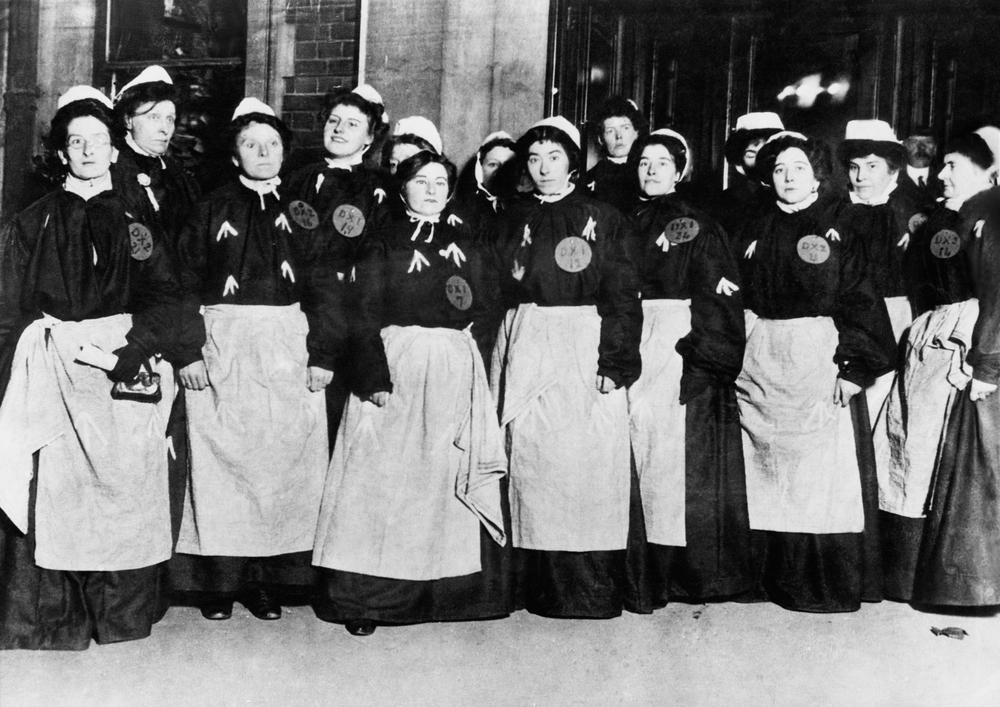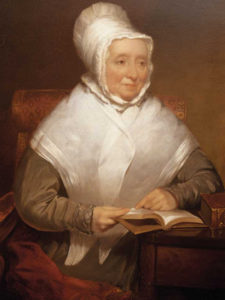
Sometimes women’s contributions to the political and economic life of past centuries are overlooked, not because they were minor, but simply because they were seen as stories of daily ‘domestic’ life and therefore inherently less significant than accounts of war, conquest, and statecraft. Since the 1960s, there has been a movement within the discipline of history to correct these omissions. Historians like Gerda Lerner, Anna Firor Scott, Deborah Gray White, and so many more began the work of filling in forgotten and otherwise neglected aspects of history, often in the newly emerging subfields of women’s history and black history.

However, despite all the excellent work that has been done over the past sixty years, there are still gaps in our knowledge. The evidence that I’d like to offer on that point today is the life and work of Hannah Mather Crocker. Despite being a leading political theorist in the post-Revolutionary era and the first woman to write a book-length discourse on women’s rights, Observations on the Real Rights of Women (1818), Crocker was overlooked for most of the 20th century. A 2006 APSR article—one of only a handful of academic publications to deal seriously with Crocker’s work—suggests that Crocker may have been set aside in part because Elizabeth Cady Stanton, Susan B. Anthony, and Matilda Gage were critical of her arguments in their first-moving and highly influential 1886 History of Woman Suffrage.[1] This goes to show the importance of going beyond standard ‘textbook’ accounts of intellectual history. Every contribution is a filter, and what was filtered out when answering yesterday’s questions may be exactly what we want to understand today.
In defense of Stanton and friends, Crocker’s ambitions do seem pretty modest compared to those of the later 19th century feminists. She prefaces Observations on the Real Rights of Women as a “little work” that was “not written with a design of promoting any altercation or dispute respecting inferiority or superiority, of the sexes” (p. 2; all page numbers below refer to this same book). She also often seems to uphold traditional gender roles, conceding to her contemporary readers that the actions of “females trespassing on masculine ground” are both “morally incorrect, and physically improper.” (p. 3). Yet! She writes to us from 1818 in defense of an idea that remains in dispute 200 years later: that despite any and all biological differences, woman are every bit as capable of intelligence and discernment as their male counterparts and deserve the same rights to make their own decisions. Despite the biological reality of being a woman, with all its “duties peculiar”—the most singular of these being childbirth and childcare–“the wise Author of nature has endowed the female mind with equal powers and faculties, and given them the same right of judging and acting for themselves, as he gave to the male sex” (p. 2)
Perhaps the most consistent argument throughout is this argument about how much is lost when women do not or are not able to cultivate their intellectual capabilities. Like other early thinkers on questions of women’s rights, including Mary Wollstonecraft and John Stuart Mill, this emphasis leads focuses on barriers to women’s education as particularly harmful: “it has been fairly proved, even to demonstration, that the female powers and faculties are equal with the men; but their mode of education often checks their progress in learning” (p. 26). Part of the harm Crocker sees in limiting women’s education is that any ignorance will be transmitted to the little “olive branches around her table.” This prioritization of women’s role as mothers is a tough one to grapple with. In emphasizing maternal responsibility, Crocker is well in line with her times. Yet this idea that women’s most appropriate role is as the caretaker will later on come to be twisted for use in political arguments about whether or not women should be allowed particular rights or admitted into particular spaces. This may be another reason why her contributions have been discounted by later generations of feminists.
Overall, Crocker’s treatise on women’s rights may be much more important than it’s been given credit for. She makes strong arguments about women’s intellectual and moral equality. Further, she is offering these arguments during a period of time in American history that was arguably the most restrictive in terms of what women were considered capable of managing. My next post will share some ideas from Crocker that deal directly with women’s productive and managerial roles, particularly in civil society and household government.
[1] Botting, Eileen Hunt, and Sarah L. Houser. 2006. “‘Drawing the Line of Equality’: Hannah Mather Crocker on Women’s Rights.” The American Political Science Review 100 (2): 265–78.
Jayme Lemke is a Senior Research Fellow and Associate Director of Academic and Student Programs at the Mercatus Center at George Mason University and a Senior Fellow in the F.A. Hayek Program for Advanced Study in Philosophy, Politics, and Economics.

Comments are closed.